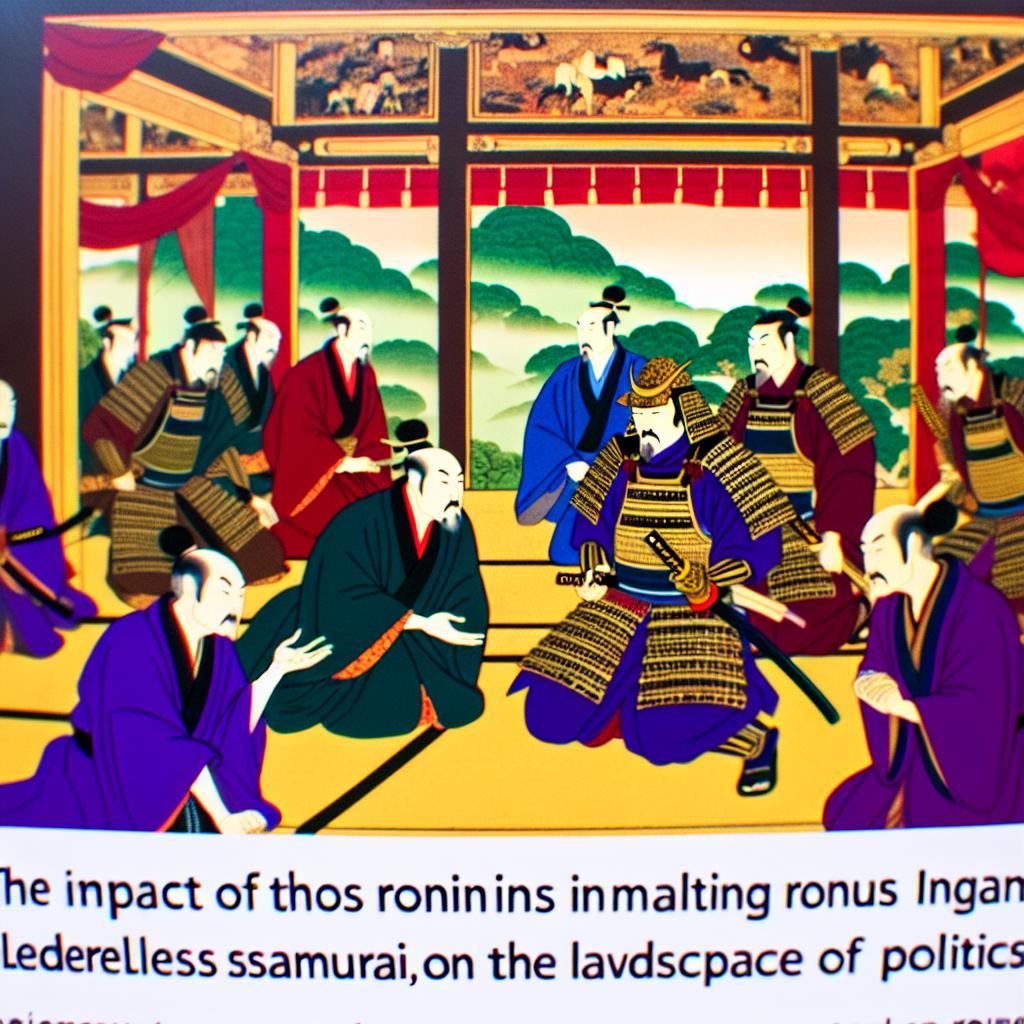The Emergence of Ronins in Japanese History
The term ronin refers to a samurai without a lord or master during the feudal period of Japan (1185–1868). Traditionally, a samurai was bound by a duty of loyalty to his daimyo or feudal lord. However, if a samurai’s master died or fell from power, the samurai became a ronin. This status not only altered the individual’s social position but also had broader implications on Japanese politics and society.
The Socio-Political Environment
During the Edo Period (1603-1868), Japan was under the strict feudal system of the Tokugawa shogunate, which sought to bring order to a country that had been in turmoil. The shogunate meticulously organized society under a rigid hierarchy, with samurais positioned at the top of this system. Ronins emerged as a disruption within this structure, operating outside the established social order. This often left them economically disadvantaged and marginalized, creating tension and discontent within the society.
Understanding the Social Hierarchy
At the heart of the Tokugawa period’s social hierarchy was a complex structure that dictated the roles and responsibilities of different classes. The samurai class, which included ronins, was expected to maintain loyalty to their feudal lords. The loss of a master put ronins in a precarious position, as their duties and identities were deeply intertwined with their service. This detachment from the traditional roles created both a challenge and an opportunity for ronins.
The existence of ronins symbolized a break from the rigidity of the hierarchical system, illustrating the potential for change within a structured society. They represented a group not tethered to the same confines, which allowed them to explore new roles within the volatile political landscape of Japan at the time.
Ronins as Political Actors
The presence of ronins had a significant influence on Japanese politics. Unlike other samurais, who were bound by obligations to their lords, ronins were not bound by such duties. This provided them the freedom to operate with a degree of political flexibility unheard of for their bound counterparts. Some ronins seized this opportunity by engaging in political activities, participating in rebellions, or lending their martial expertise to other feudal lords with need of skilled warriors.
A notable example is the involvement of ronins in the events that led up to the Meiji Restoration. Disenchanted by the constraints of the feudal system, many ronins supported the movement advocating for the modernization of Japan and the dismantling of the Tokugawa regime. Their contribution to these efforts cannot be understated, as they provided both manpower and ideological support to the cause of imperial rule.
Economic and Social Impacts
Economically, ronins often found themselves at a disadvantage due to the absence of stipends typically provided under the aegis of a daimyo. This financial strain forced many ronins to seek alternative forms of employment. While some adapted by becoming farmers or laborers, others resorted to unsavory behaviors, such as banditry, further contributing to societal unrest.
This economic shift also highlighted the vulnerabilities in the sociopolitical system of the time. With ronins turning to alternative means of livelihood, the social fabric of the era faced challenges that questioned the sustainability and fairness of the feudal system.
Socially, the presence of ronins challenged established norms and became symbols of resistance and autonomy against rigid hierarchies. Over time, their condition highlighted inherent issues within the feudal system, such as class disparities and the role of the samurai. These issues contributed to the eventual dismantling of Japan’s feudal system as it transitioned to modernization.
The Concept of Honor and Its Repercussions
In feudal Japan, the concept of bushido, or the way of the warrior, was central to the identity of the samurai. It emphasized virtues such as loyalty, honor, and duty. For ronins, the loss of a master was deeply tied to their sense of honor and identity. Some ronins even chose to commit seppuku (ritual suicide) rather than face a life without a master, highlighting the intense psychological and cultural impacts of their status.
On the other hand, some ronins rejected these traditional notions, choosing instead to carve out a unique identity and path, free from the constraints of the hierarchical feudal order. This rejection of traditional values often led them to take more radical stances on political and social issues of the time, thereby impacting broader societal changes.
Legacy of the Ronins
The legacy of ronins is one of paradox and complexity. On one hand, they were seen as marginalized outcasts of the feudal system; on the other hand, they were viewed as pioneers in challenging and reshaping the socio-political landscape of Japan.
Their story is a testament to the adaptability and resilience of individuals in the face of structural and personal challenges. The ronins’ influence is particularly evident in the transition from Japan’s isolated feudal society to a period of modernization and global recognition. Ronins played a key role in this transformative process, showing how individuals can impact historical and political shifts even when outside established power structures.
Conclusion
The impact of ronins on Japanese politics was profound. They represented the complexities and inherent instabilities in the feudal system, often serving as catalysts for change. As Japan navigated several political transitions, including the Meiji Restoration, the role of ronins illustrates how individuals operating outside traditional structures can influence broader historical and political shifts. Their legacy is a reminder of how those perceived as outcasts or outsiders can impact the course of history by challenging conventional narratives and embracing autonomy.

